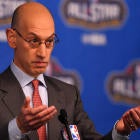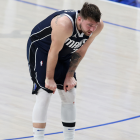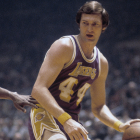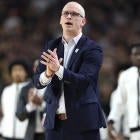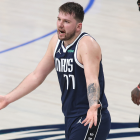Sure, we live in a talk radio, Twitter-universe world. So when something like the issue of NBA players resting comes up, and heavyweights in the sport like LeBron James and commissioner Adam Silver discuss it, the temptation is to take a two-step approach.
Step 1: Find who is to blame. The potential culprits: The players, the teams, the league, or the television networks who broadcast the NBA.
Step 2: Try to shame that bogeyman into giving in.
The reality of this issue -- and to be clear, Silver is right, it truly looms as a “significant issue” -- doesn’t just require a change from one of the four stakeholders identified. Not only would that be unfair, it wouldn’t even work, and would ultimately be detrimental to everyone else. This requires a solution with buy-in from everyone.
Take, for instance, the common refrain from those most apt to treat NBA players as commodities for some reason instead of people. Say the players, who are the reason so many people watch the NBA and so much money is made by the league, simply decided to eschew proper rest -- to “get your ass playing,” as Karl Malone put it.
What we know happens next is simple: Players will not play at as high a level. Injuries will increase, which will lead to more absences, the very part of the rest most objectionable to everyone else. Teams that have spent vast sums of money to pay the players will get less of a return on their investments. Players will have shorter careers. The league’s quality of play will suffer relative to a league where players are given appropriate rest and recovery in keeping with the research provided by front offices studying this. And the television networks won’t have nearly as exciting a product to show.
So in theory, everybody but the players win in that scenario. In practice, everybody loses.
Shortening the season won’t work. That would cost owners revenue and runs afoul of promised inventory to regional and national television providers. And where do you think owners will go to make up that revenue? A good guess is raising ticket prices, so just as with the unexpected absences, it will be fans suffering.
And yet teams have a dilemma when fans show up for a game with players absent without explanation. Television partners suffer when star players sit out key matchups. But rest is inevitable and vital in a league where players are still being asked to go back-to-back, or play three games in four days, and the measure of any player or team is how well they play in the playoffs -- you know, after the 82-game marathon.
There are ways to solve this. The bad news is they’ll require buy-in from everybody. The good news is that this is not your older brother’s NBA. Adam Silver, rather than attempting to roll over Michele Roberts and the NBPA, forged a strong working relationship with her. Roberts plays a key part in this dynamic, too, as an effective and intelligent leader of her union. Already, the two sides have improved the overall picture, one that involves time and effort, by shortening the preseason, allowing more calendar space for the 82-game season.
The solution comes from some combination of the following: ample notice from teams about potential player absences, first and foremost. No one expects the Warriors to play Kevin Durant right now. The sooner everyone accepts the reality that players rest more now than they did 20 years ago because scientific research has shown the importance of it, then the better off everyone will be. The extent to which Gregg Popovich -- no one’s idea of a pushover -- has led on this issue ought to help.
So simply letting people know days -- or even weeks -- ahead of time can mitigate against some of the disappointment that comes along with such decisions. An incentive system from the league, rewarding teams for the more lead time with which they provide that information, is an example of a carrot to help everyone plan for something vital, rather than a stick to discourage something to keep players healthy.
The league, in turn, can offer greater flexibility to TV partners on national broadcasts. If it turns out that the Cavs are going to rest LeBron James on a Saturday night, and Cleveland provides the league with that information weeks ahead of time, flexing another game into the slot is far easier than if Cleveland lets the league know, say, 90 minutes to tip-off. Creating other incentives for fans holding those tickets becomes far easier for teams, as well. Such practices are good for everyone, really, since San Antonio’s success hasn’t come nearly as much from giving players random days off once tired, but rather by creating a schedule well ahead of time to make sure players aren’t overtaxed. More preventive rest is far more effective.
Television partners might not love the idea that they might not get Cavs-Warriors precisely how they planned it, but once again, that’s only a concern in search of an answer in a world where sufficient rest for players is somehow optional. That’s not where science is here in 2017, and pretending otherwise isn’t helpful to anyone. It’s disappointing, like an injured Kevin Durant not playing is disappointing. No one expects Durant to hop onto the court right now because ABC has the game.
Greater cooperation with the entities that helped make this summer’s enormous jump in the salary cap possible, though? That makes sense for everyone.
Ultimately, this is not a crisis for the NBA, in the way the NFL is going to have to come to terms with, eventually, the fact that the contact that follows each snap of the football is a contributing cause of crippling medical problems. This is a circumstance with many stakeholders, much of whose interests already overlap, and a commissioner and players association that has demonstrated as well as any in recent league history the ability to solve such problems.
That may not sound good in a tweet. But it has the added benefit of being true.












